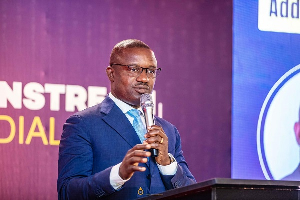The Media Coalition Against Open Defecation (M-CODe) has called for collective action to end open defecation by 2030, in accordance with Sustainable Development Goal (SDG) 6.
The M-CODe, therefore, issued a clarion call to stakeholders in the Water, Sanitation, and Hygiene (WASH) sector to escalate efforts to address the lingering issue of open defecation in Ghana.
Francis Ameyibor, M-CODe National Convenor, who made the call, emphasizes the need for collective action to change the narrative and ensure a clean, healthy, and prosperous society.
The M-CODe National Convenor, who spoke to newsmen on the sidelines of the 2024 Ghana WASH Week National Stakeholders Dialogue in Accra, urged stakeholders to scale up investment in WASH infrastructure and enhance community engagement and education.
The 2024 Ghana WASH Week is being organized by the Ghana Coalition of NGOs in the Water and Sanitation Sector (CONIWAS) on the general theme “WASH Prioritization and Its Impacts on Social Development."
He also urged stakeholders to engage with M-CODe to promote behavioural change and adoption of safe sanitation practices and support research and development of innovative solutions as the world moves closer towards the 2030 target year for the attainment of the Sustainable Development Goals (SDG).
According to the World Health Organization (WHO), approximately 2.3 billion people worldwide use unsafe toilets or defecate in the open, with Ghana ranking among the top five countries in Africa with the highest number of people practicing open defecation.
“This alarming situation perpetuates the cycle of poverty, disease, and environmental degradation,” Mr. Ameyibor stated.
The M-CODe, comprising various media outlets and journalists, has been at the forefront of advocating for improved WASH services and an end to open defecation.
Ameyibor emphasizes that ending open defecation requires a collaborative effort from government agencies, development partners, civil society organizations, and individuals.
“By working together, Ghana can achieve the Sustainable Development Goal (SDG) 6.2 target of ensuring access to safe sanitation for all,” the M-CODe National Convenor stated.
The M-CODe urges stakeholders to use this occasion of the 2024 Ghana WASH Week celebration to recommit to the cause and intensify efforts to create a society where everyone has access to safe and dignified sanitation.
“Together, we can create a Ghana free from open defecation, where everyone can thrive in a clean, healthy, and prosperous environment,” Ameyibor stated.
Meanwhile, Beara Awinpoka Akanyani, Chairperson of CONIWAS, explained that the rationale for the commemoration was, among other things, to raise national awareness about the critical importance of improved Water, Sanitation, and Hygiene (WASH) services.
The CONIWAS Chairperson stressed that the 2024 Ghana WASH Week is a platform to highlight the essential role of WASH in achieving the SDGs and its impact on public health, economic growth, educational outcomes, social equity, and environmental sustainability.
The dialogue brought together various stakeholders, including government representatives, development partners, WASH sector players, the Media Coalition Against Open Defecation (M-CODe), and the media.
The stakeholders discussed the institutional frameworks, WASH and Neglected Tropical Diseases (NTD), and community engagement activities.
The 2024 WASH Week includes activities such as stakeholder engagements, media campaigns, sanitation walks, school visits, and religious teachings on WASH.
The event is supported by the Ministry of Sanitation and Water Resources, the World Bank, the GAMA SWP project, UNICEF, the IRC, WaterAid Ghana, Global Communities, Plan International Ghana, SNV, CRS, APDO, and PATH Ghana.
The objectives of the dialogue are to raise public awareness, advocate for increased investment, empower communities, and foster stakeholder collaboration to achieve sustainable WASH services for all.
Among the speakers are Professor Simon Mariwah, Department of Geography and Regional Planning, University of Cape Coast, who spoke on the subject: “WASH prioritization and its impacts on social development.”
Other activities to mark the 2024 WASH Week include discussion on institutional frameworks for WASH and facilitating an open conversation about how we can strengthen these structures.
A dialogue on WASH and Neglected Tropical Diseases (NTD), aims to educate participants on the linkages between WASH and NTDs and highlight relevant interventions, in collaboration with WaterAid Ghana.
CONIWAS members across different zones would also engage in various activities, including district- and community-level engagements.
In the Northern Zone, APDO will work with the Ghana Health Service and other stakeholders to discuss WASH's impact on public health in the Nanton District.
Similar activities focusing on education, including school visits, will take place within the Middle Zone in the Kwahu Afram Plains North-Eastern Region.
Additional activities include radio discussions on WASH by CARO Ghana, ProNet North, Global Communities, and SNV in the Upper West Region, a visit to the St. Johns Integrated Special Secondary Technical School in Navrongo in the Upper East Region, and WASH sermons at mosques on Friday in Tamale.
Regional News of Thursday, 11 July 2024
Source: Francis Ameyibor, Contributor

















